Islamic State group claims Bastille Day attack in Nice

The Islamic State (IS) group claimed responsibility Saturday for the truck massacre in Nice which France said was "a new kind of attack," as it faced hard questions over security failures.
In a statement via its Amaq news service, IS said one of its "soldiers" carried out Thursday night's attack "in response to calls to target nations of coalition states that are fighting (IS)".
Tunisian Mohamed Lahouaiej-Bouhlel, 31, ploughed a 19-tonne truck into a crowd of people which had been watching Bastille Day fireworks in the Riviera city, killing 84 and injuring 200 people.
After crisis talks in Paris, French Defence Minister Jean-Yves Le Drian recalled that IS had recently repeated calls to supporters to "directly attack the French, Americans, wherever they are and by whatever means."
"Even if Daesh (Arabic name for IS) does not organise, Daesh breathes life into the terrorist spirit that we are fighting," he said, adding this meant France must keep up its fight against the jihadists in Iraq and Syria.
Facing its third major terror attack within 18 months, the French government is coming under fire from opposition politicians and newspapers demanding more than "the same old solemn declarations".
Interior Minister Bernard Cazeneuve said that, after gunmen and suicide bombings, France was facing "a new kind of attack".
Speaking as France began three days of mourning on Saturday, he said Lahouaiej-Bouhlel "had not been known to the intelligence services because he did not stand out... by being linked with radical Islamic ideology".
'Radicalised quickly'
Police said Saturday they have arrested four more people linked to Lahouaiej-Bouhlel, as well as his estranged wife.
Cazeneuve said that the father-of-three "seemed to have been radicalised very quickly, from what his friends and family" have told police.
"We are now confronted with individuals open to IS's message to engage in extremely violent actions without necessarily having been trained or having the weapons to carry out a mass (casualty) attack."
Some 30,000 people had thronged the palm tree-lined Promenade des Anglais on Thursday night to watch a fireworks display with their friends and families, but the night turned to horror as the truck left mangled bodies strewn in its wake.
On Saturday Nice's seaside streets and beaches that would normally be bustling on a summer weekend were near-deserted, with teary residents making their way to the promenade to lay down flowers in memory of the dead.
At least 10 children and teenagers were among the dead as well as tourists from the United States, Russia, Ukraine, Switzerland and Germany.
A spokeswoman for the Nice hospital said 16 bodies had not yet been identified. She said five children were still in a "critical condition", and an eight-year-old in a stable condition had not been identified.
France 'deeply shocked'
Cazeneuve said the carnage had "deeply shocked the French and at the same time shows the extreme difficulty of the anti-terrorism fight."
IS also claimed responsibility for the November 13 attacks which killed 130 people in Paris, while gunmen in January 2015 attacks on the Charlie Hebdo weekly and a Jewish supermarket were linked to both IS and Al-Qaeda.
A French parliamentary inquiry last week criticised numerous failings by the intelligence services over the Paris attacks.
France, which has a Muslim population of nearly five million, is also home to hundreds of jihadists who have flocked to fight alongside IS.
Presidential contender and former prime minister Alain Juppe said Friday that the latest carnage could have been prevented if "all measures" had been taken.
But government spokesman Stephane Le Foll slammed Juppe's comments, saying there was as much security present for the fireworks display as there had been for the Euro 2016 football tournament in the city.
He said there were more than 185 police, gendarmes and soldiers on the ground, as well as municipal police and a vast network of surveillance cameras.
"Despite all of that, this man's decisions... created the drama and horror we experienced."
Cazeneuve also defended the security measures taken for the celebrations of France's national day.
He said police cars were unable to follow the truck onto the seaside walkway after it had "violently forced through the barriers" and onto the sidewalk.
The truck zigzagged for two kilometres into the crowd before police bullets killed the driver and brought an end to the carnage.
A statement from IS's official radio bulletin Al-Bayan said the attacker had carried out a "new, special operation using a truck".
Al-Bayan warned that Western countries "will not be spared from the blows of the mujahideen" no matter how much they increase their security measures.
Depressed loner
While some attacks on the West -- such as the November assault on Paris and the March bombings in Brussels -- were carried out by jihadists who have been to the centre of IS operations in Iraq and Syria, others have been led by so-called "lone-wolf" attackers.
Lahouaiej-Bouhlel's father said he had suffered from depression and had "no links" to religion.
"From 2002 to 2004, he had problems that caused a nervous breakdown. He would become angry and he shouted... he would break anything he saw in front of him," Mohamed Mondher Lahouaiej-Bouhlel said in Tunisia.
Neighbours described the attacker, who worked as a delivery man, as a loner who never responded to their greetings.
He and his wife had three children, but she had demanded a divorce after a "violent argument", one neighbour said.
New MEE newsletter: Jerusalem Dispatch
Sign up to get the latest insights and analysis on Israel-Palestine, alongside Turkey Unpacked and other MEE newsletters
Middle East Eye delivers independent and unrivalled coverage and analysis of the Middle East, North Africa and beyond. To learn more about republishing this content and the associated fees, please fill out this form. More about MEE can be found here.




